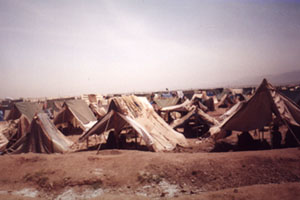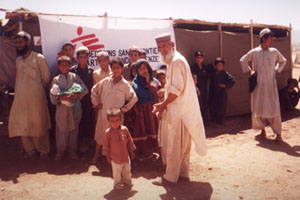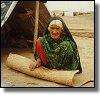
The Jalozai refugee camp in Pakistan |
While in Pakistan you oversaw the Jalozai refugee camp, which hosts approximately 60,000 Afghan refugees. What were MSF's main functions within the camp?
MSF has been the leading aid organization in Jalozai since November 2000, providing basic health care, water, and nutritional assistance. We're operating a primary health clinic for all people, both male and female. We provide just over a million liters of water a day, we have to truck that in on a daily basis. We also run a supplementary feeding center for malnourished children.
What sort of a team were you working with?
We had a relatively small team of international volunteers, basically a doctor, nurse, logistician and project coordinator, and a wonderful local staff of Afghani and Pakistani medical and logistical people, the majority of whom were themselves refugees. The outreach workers, who worked to educate the population on health risks, were people living in the camp itself who had arrived within the last 6 to 8 months. Most of the medical and logistical staff were Afghan refugees who had arrived anywhere from 5 to 15 years ago and who had since settled in Pakistan. They were all highly professional and we were lucky to have a large number of female medical staff, which is important because many of them would not have had the opportunity to work in Afghanistan.

Afghan refugees in the Jalozai camp |
What were camp conditions like? What were the main illnesses you were treating?
This was an ad-hoc, unorganized camp, since no organization had been authorized to go in and set up the registration that you would have had in a lot of camps, like in Kosovo for example. This led to chaos in terms of basic sanitation and safety. Due to the poor sanitation there was a lot of skin disease and diarrheal diseases. We would see these on a daily basis.
How did this compare to other refugee situations you have worked on with MSF?
On the positive side, again, the Afghan staff were outstanding. On the down side we had challenging relations with the authorities, which made it very frustrating.
What reasons did most of the refugees have for leaving Afghanistan?
Several NGOs did surveys while I was there, and found that the two top reasons were fleeing from conflict and the drought, and in some cases a combination of both. Other motivations, such as finding work, and even for women the idea of leaving because they are not permitted to work in Afghanistan were not found to be top reasons. I think most Afghans want to stay in Afghanistan if at all possible, even under difficult conditions, so when they do come to Pakistan it is a significant decision. Many of the people coming from the north, which has been particularly hard hit by the drought, had remained in Afghanistan throughout the previous 20 years of war with the Soviets and civil war, and are leaving for the first time-this shows how extremely precarious the situation is.
How did security issues affect the way MSF was operating, has this changed given recent events?
I suspect that not much has changed. Pakistan already hosts about 2 million refugees, their bottom line is that they're already suffering, and they don't want to bring in any more refugees.
How are the Afghan refugees accepted by the Pakistani population?
There's a mixed reaction. The Pashtun, most of the people coming from southern Afghanistan, are of the same ethnic group as the people in the Peshawar region of Pakistan-they have the same language, clothing and religious beliefs. However, many of the newer refugees came in from the north of Afghanistan, and are of different ethnic groups, with a different language, and are not as welcome as the Pashtun groups. The local population is going through what many populations go through when they face a large influx of people who are not from their own group, whether in southern France or Texas: they blame the newcomers for everything from crime to economic decline.
You were in Pakistan on September 11. How was that for you as an American?
It was very quiet and very calm inside Pakistan at that time. The police put up blockades just as a precaution, because in 1998 when the Americans retaliated there was a backlash against foreigners. We evacuated the next day to the capital and then moved out. What was strange was that I immediately tried to call the MSF office in New York but could not get through, so we suspected that things were not good in the US. After having so often been on the other side, working in conflict zones, it was a role reversal of sorts.
What was the reaction to the September 11 attacks on the U.S. from the refugees in the camp and the local staff that you were working with?
On September 11, when the first reports came out, all the Afghanis and Pakistanis that I met would put their hand over their heart and say that they were very sad and very sorry that this had happened. There was an immediate outpouring of sympathy from Afghanis and Pakistanis, it was very touching.
What's next for you?
Even before recent events I had planned on looking for a job in the U.S., dealing with disaster relief here, working with either the Red Cross or the newly created Office of Homeland Security. I had been studying this before hand, and now obviously the timing seems appropriate.




